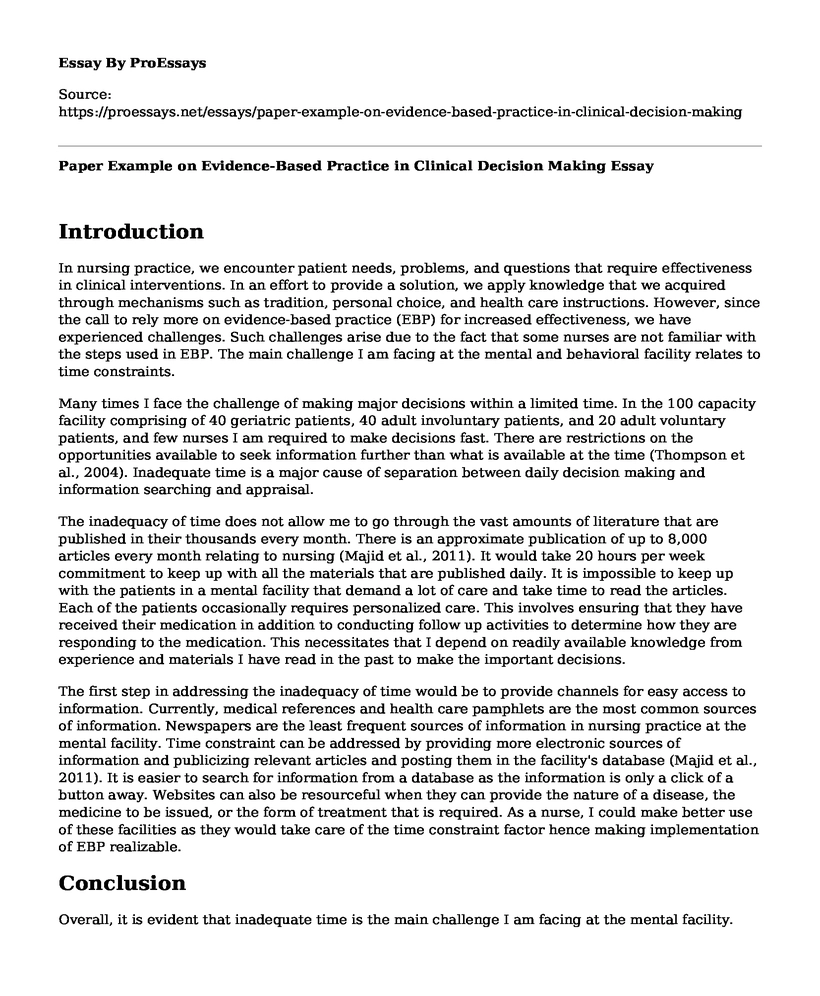Introduction
In nursing practice, we encounter patient needs, problems, and questions that require effectiveness in clinical interventions. In an effort to provide a solution, we apply knowledge that we acquired through mechanisms such as tradition, personal choice, and health care instructions. However, since the call to rely more on evidence-based practice (EBP) for increased effectiveness, we have experienced challenges. Such challenges arise due to the fact that some nurses are not familiar with the steps used in EBP. The main challenge I am facing at the mental and behavioral facility relates to time constraints.
Many times I face the challenge of making major decisions within a limited time. In the 100 capacity facility comprising of 40 geriatric patients, 40 adult involuntary patients, and 20 adult voluntary patients, and few nurses I am required to make decisions fast. There are restrictions on the opportunities available to seek information further than what is available at the time (Thompson et al., 2004). Inadequate time is a major cause of separation between daily decision making and information searching and appraisal.
The inadequacy of time does not allow me to go through the vast amounts of literature that are published in their thousands every month. There is an approximate publication of up to 8,000 articles every month relating to nursing (Majid et al., 2011). It would take 20 hours per week commitment to keep up with all the materials that are published daily. It is impossible to keep up with the patients in a mental facility that demand a lot of care and take time to read the articles. Each of the patients occasionally requires personalized care. This involves ensuring that they have received their medication in addition to conducting follow up activities to determine how they are responding to the medication. This necessitates that I depend on readily available knowledge from experience and materials I have read in the past to make the important decisions.
The first step in addressing the inadequacy of time would be to provide channels for easy access to information. Currently, medical references and health care pamphlets are the most common sources of information. Newspapers are the least frequent sources of information in nursing practice at the mental facility. Time constraint can be addressed by providing more electronic sources of information and publicizing relevant articles and posting them in the facility's database (Majid et al., 2011). It is easier to search for information from a database as the information is only a click of a button away. Websites can also be resourceful when they can provide the nature of a disease, the medicine to be issued, or the form of treatment that is required. As a nurse, I could make better use of these facilities as they would take care of the time constraint factor hence making implementation of EBP realizable.
Conclusion
Overall, it is evident that inadequate time is the main challenge I am facing at the mental facility. There is hardly time to go through the stacks of information before arriving at a decision concerning the treatment of a patient. Working at a mental facility is very time-intensive because of the nature of the illnesses we have to cope with. They range from schizophrenia, personality disorders, and depression. Availing materials that offer easy access to the database can be a major step towards the adoption of EBP. Patients will be able to experience efficiency in service provision after this implementation.
References
Majid, S., Foo, S., Luyt, B., Zhang, X., Theng, Y. L., Chang, Y. K., & Mokhtar, I. A. (2011). Adopting evidence-based practice in clinical decision making: nurses' perceptions, knowledge, and barriers. Journal of the Medical Library Association: JMLA, 99(3), 229.
Thompson, C., Cullum, N., McCaughan, D., Sheldon, T., & Raynor, P. (2004). Nurses, information use, and clinical decision making-the real world potential for evidence-based decisions in nursing. Evidence-Based Nursing, 7(3), 68-72.
Cite this page
Paper Example on Evidence-Based Practice in Clinical Decision Making. (2022, Jul 15). Retrieved from https://proessays.net/essays/paper-example-on-evidence-based-practice-in-clinical-decision-making
If you are the original author of this essay and no longer wish to have it published on the ProEssays website, please click below to request its removal:
- Data Privacy Law: Comparison Between the United States and Saudi Arabia
- Essay Sample on Diabetic Incidences in Schools
- Mental and Mental Health Nurse Practitioner in Texas Paper Example
- Ethical Issues in the Treatment of Infertility Essay
- Strategic Analysis of Campbell's Soup Company Paper Example
- Essay Sample on Portfolio Analysis: Allocating Resources for Greater Profits
- Paper Sample on ConnectiveRx: Enhancing Patient Support Through Mergers & Acquisitions







